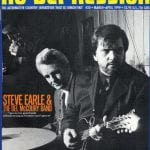Kevin Meisel – Wanderers and seekers
From Rock Springs and Great Falls to Vietnam. Cajon Pass, Chapel Hill, and the Crescent Moon Motel. One of the first things that strikes you about Kevin Meisel’s fine debut, Coal And Diamonds, is the strong sense of place that permeates the album. Heck, the main character in the album-opening coal-mining song “Red Moshannon” is a river.
“There are places in this country that have absorbed the essences of its inhabitants somehow,” explains Meisel, who joins other emerging artists such as Jim Roll, Chris Buhalis and founder Gary Cornelius on the Chicago-based One Man Clapping label. “That collective absorption is the character of the place. To make the songs believable, I wanted to capture some of that.”
The human characters in Meisel’s songs are equally as real and compelling: the young female migrant worker in “Seeds I’ve Sown”, the soul-searching veteran of “No Easy Understanding”, the soon-to-be newlyweds from “Behind This Veil”. His songs tend to be about wanderers and seekers — perhaps because, like most musicians, he’s a little bit of both himself.
His wanderlust and an interest in painting (“I used to paint these eight-foot landscapes of ravaged fields and hillsides,” Meisel says) took him from Michigan to New York City. He made his Big Apple debut as an underground performer, literally, by playing in the subway. “I think it was the reverb and echo that drew me. The commuters are one hell of an audience to capture,” Meisel recalls. “I remember the unspoken turf wars: me, the Dylan wannabe on the south end, and the Ornette Coleman wannabe on the north end.”
The D word was bound to come up at some point, given the sweeping narratives on Coal And Diamonds and the Desire-era folk-rock that propels a number of the songs, with fiddle, harmonica and subtle keyboards wandering (there’s that word again) in and out. “I look to Dylan quite constantly. It’s for the permission to phrase and to discover lyrically,” say Meisel, who goes on to cite Lou Reed and Robbie Robertson as two other “granddaddy” artists to whom he turns for inspiration, as well as younger folks such as Richard Buckner, Jay Farrar, and Jason Ringenberg (whom Meisel calls “a sadly underrated songwriter”).
A few cuts also bring to mind John Prine — “The Great Transmission” and the album’s catchiest moment, “Little Magnolia” — while “Tethered Angels” and “No Easy Undertaking” recall Bruce Springsteen in rustic troubadour mode. “Oh yeah, Springsteen is a big one,” Meisel affirms. “Nebraska could be spotted with a microscope in my blood cells….I met him briefly after one of the Tom Joad shows and shook his hand and got his autograph — which can explain the way Nebraska actually got transmitted into me.”




